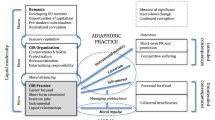Abstract
This paper aims to show how and why corporate social responsibility (CSR) remains a myth in the Philippines. The paper proposes a theory of the CSR myth based on Erving Goffman's dramaturgy, supported by Anthony Giddens’ structuration theory and Carl Weick's concept of ‘equivocality’. It establishes the myth theory by identifying, examining and discussing conditions and issues in CSR practice that are contrary to its essence and nature. The paper also seeks to show that the root reason for the CSR myth is a lack of ethics in CSR and CSR-related activities, which stems from a conflict between ensuring profits and the need to do good and establish good community relations. Thus, the paper explains why scholars and practitioners need to rectify popular CSR theory and practice, and proposes a theoretical perspective by which to view CSR practice, based on universally accepted definitions and CSR concepts culled from literature, as applied to the Philippine situation.
Similar content being viewed by others
References
AIM (Asian Institute of Management) – Ramon V. Del Rosario Sr. (RVR) Centre for Corporate Responsibility. (1999) Annual Report on Corporate Giving. Makati, Metro Manila: AIM Conference Centre.
Alechnowicz, K.L. and Chapman, S. (2004) The Philippine tobacco industry: The strongest tobacco lobby in Asia. Tobacco Control 13: 71–78.
Ampil, R. (2008) Sin and sensibility: Can a company be socially responsible if it makes harmful products? Newsbreak, March–May, pp. 40–43.
Arcilla, W. (2007) RP has too much advertising clutter. Philippine Daily Inquirer, 30 November.
Bowen, H.R. (1953) Social Responsibilities of the Businessman. New York: Harper and Row.
Brown, R.E. (2008) Sea change: Santa Barbara and the eruption of corporate social responsibility. Public Relations Review 34 (1): 1–8.
Campbell, J. (2006) Institutional analysis of the paradox of corporate social responsibility. American Behavioural Scientist 49 (7): 925–938.
Carroll, A.B. (1979) A three-dimensional conceptual model of corporate performance. Academy of Management Review 4 (4): 497–505.
Carroll, A.B. (1999) Corporate social responsibility: Evolution of a definitional construct. Business & Society 38: 268–295.
Chapple, W. and Moon, J. (2005) Corporate social responsibility (CSR) in Asia: A seven-country study of CSR website reporting. Business & Society 44 (4): 415–441.
Chomsky, N. (1975) The Logical Structure of Linguistic Theory. New York: Plenum.
Connor, A. and Meister, M. (2008) Corporate social responsibility attribute rankings. Public Relations Review 34 (1): 48–50.
Crouch, C. (2005) Modelling the firm in its market organizational environment: Methodologies for studying corporate responsibility. Organization Studies 27 (10): 1533–1551.
Davis, K. (1960) Can business afford to ignore social responsibilities? California Management Review 2 (Spring): 70–76.
De George, R. (2008) Reflections on citizenship, inc. Business Ethics Quarterly 18 (1): 43–50.
De Soto, H. (2000) The Mystery of Capital: Why Capitalism Triumphs in the West and Fails Everywhere Else. New York: Basic Books.
De Torre, J. (1980) Christian Philosophy. Manila: Vera-Reyes.
Deegan, C. (2002) The legitimizing effect of social and environmental disclosures – A theoretical foundation. Accounting, Auditing and Accountability Journal 15: 282–311.
Estopace, D. (2008) Benevolent capitalists. Newsbreak, March–May, pp. 49–52.
Fligstein, N. and Freeland, R. (1995) Theoretical and comparative perspectives on corporate organization. Annual Review of Sociology 21: 21–43.
Giddens, A. (1976) New Rules of Sociological Method. New York: Basic Books.
Godfrey, P. and Hatch, N. (1999) Toward a general theory of CSRs. Business & Society OnlineFirst, advance online publication 24 April, doi:10.1177/0007650308315494.
Goffman, E. (1959) The Presentation of Self in Everyday Life. New York: Doubleday.
Golob, U. and Bartlett, J. (2007) Communicating about corporate social responsibility: A comparative study of CSR reporting in Australia and Slovenia. Public Relations Review 33 (1): 1–9.
Grau, S. and Folse, J. (2008) Cause-related marketing. Journal of Advertising 36 (4): 19–33.
Heymans, S.J. (1963) ‘Letter no. 6, Philip Morris’, in K.L. Alechnowicz and S. Chapman, ‘The Philippine Tobacco Industry: The Strongest Tobacco Lobby in Asia’. Tobacco Control 13: 71–78.
Johnson, H.L. (1971) Business in Contemporary Society: Framework and Issues. Belmont, CA: Wadsworth.
Lobstein, T. (2004) Child obesity: Public health meets the global economy. Consumer Policy Review 14 (January/February): 3–7.
Lorenzo-Molo, M.C.F. (2007) Understanding the reputation and image of the Philippine public relations industry. Public Relations Review 33 (1): 58–67.
Maignan, I. and Ferrell, O.C. (2006) Corporate social responsibility and marketing: An integrative framework. Journal of the Academy of Marketing Science 32 (1): 3–19.
Maximiano, J.M. (2006) CSR integration into core business: Among selected firms in the Philippines, http://www.nottingham.ac.uk/business/ICCSR/AsiaConf06/AbstractPdfs/Maximiano.pdf, accessed 2 May 2008.
McBride, S. (2003) ‘Corporate-governance Reforms in Asia Appear Mostly Cosmetic’, The Asian Wall Street Journal. In: A. Rebolledo and C. Nugid-Anden (eds.) ‘SRI in Asian Markets: Philippines (ASrIA Report)’. World Bank Group; International Finance Corporation (IFC), http://www.asria.org/ref/countries/philippines, accessed 2 May 2008.
Monbiot, G. (2007) Don’t listen to what the rich world's leaders say – Look at what they do. Guardian, 5 June, http://www.guardian.co.uk/commentisfree/story/0,,2095677,00.html, accessed 16 March 2008.
Neron, P. and Norman, W. (2008) Citizenship inc.: Do we really want business to be good corporate citizens? Business Ethics Quarterly 18 (1): 1–26.
Rebolledo, A. and Nugid-Anden, C. (2003) SRI in Asian Markets: Philippines (ASrIA Report). World Bank Group, International Finance Corporation (IFC), http://www.asria.org/ref/countries/philippines, accessed 2 May 2008.
Rimando, L. (2008a) Spreading family values the aboitiz way. Newsbreak, March–May, pp. 53–54.
Rimando, L. (2008b) Getting out of public relations and philanthropy. Newsbreak, March–May, pp. 8–11.
Tuzzolino, F. and Armandi, B.R. (1981) A need-hierarchy framework for assessing corporate social responsibility. Academy of Management Review 6: 2–28.
Weick, C. (1979) The Social Psychology of Organizing, 2nd edn. Reading, Massachusetts: Addison-Wesley.
Wood, D. and Logsdon, J. (2008) Business citizenship as metaphor and reality. Business Ethics Quarterly 18 (1): 51–59.
Author information
Authors and Affiliations
Rights and permissions
About this article
Cite this article
Lorenzo-Molo, M. Why corporate social responsibility (CSR) remains a myth: The case of the Philippines. Asian Bus Manage 8, 149–168 (2009). https://doi.org/10.1057/abm.2009.2
Received:
Revised:
Accepted:
Published:
Issue Date:
DOI: https://doi.org/10.1057/abm.2009.2




